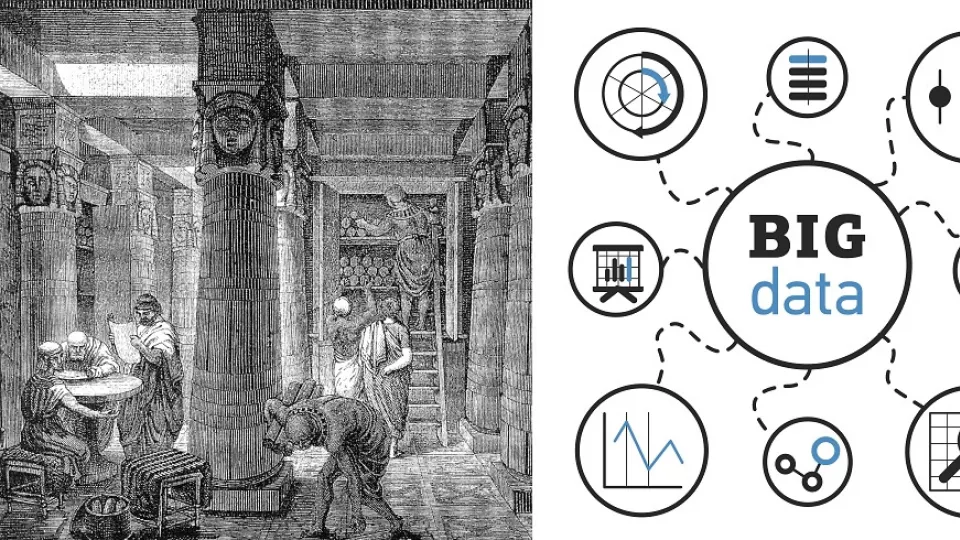
What do medical research and the Library of Alexandria have in common?
Left: The Great Library of Alexandria, O. Von Corven, 1st Century, Public Domain
Right: Big Data Image, Courtesy of Shutterstock
“The library of Alexandria was a great data repository,” began Randall Wetzel, MD, during a presentation at Children’s Hospital Los Angeles on Friday, August 14, about the role of big data in the future of healthcare and research. Built in the 3rd century BCE, the library was one of the largest centers of learning and scholarship of its time, gathering together an unprecedented amount of knowledge for the perusal and review of some of the ancient world’s most renowned scholars.
Today, biomedical researchers and healthcare professionals aim to create and expand medical data repositories as part of a trend known as “big data”. Big data refers to large and complex data sets that require far more than standard analysis to process. From Formula 1 car races to Facebook, big data has revolutionized how we gather and interpret information on a large scale.
Today, we create 2.5 quintillion bytes of data daily, which is equivalent to the amount of data created from the beginning of human civilization until 2003. This vast amount of information is far too much for the human brain to process, which is why scientists turn to artificial intelligence (AI). A branch of AI, known as machine learning, creates systems that can actually learn from incoming data, allowing the computer to adapt potential solutions based on a variety of data and factors it encounters.
With such an expansive amount of data created, researchers are now looking to this technology for answers to many of medicine’s questions.
“The patient is data,” said Wetzel. “Medicine is inherently experimental, and we have done a gazillion experiments [in the past] and just thrown the data away.”
New information systems at CHLA and other institutions nationwide are focusing on collecting data into a central warehouse of sorts, a big data repository, from which it can be analyzed for research and clinical purposes. Instead of identifying problems and then collecting data based on the nature of the questions at hand, researchers can now identify relevant data, generate questions and then mine the data to find the answer.
For example, scientists at CHLA recently developed a pandemic disaster triage methodology based on over 150,000 critically ill children and conducted a computer simulated emergency in children that demonstrated 25% improved survival compared to current triage models.
However, there are precautions and concerns to address when it comes to utilizing big data methods in medicine. Data security, particularly when involving patient information, is a must according to Wetzel, as well as avoiding disruption of the clinical workflow.
“The application of Big Data techniques to patient data holds the promise of new discoveries and faster delivery of information to the bedside when it is needed,” says Wetzel. “And it may hold the solution to improving patient outcomes and reducing the cost of health care.”


